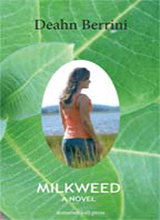Deahn Berrini – Milkweed: A Novel. Reviewed by Sasha Mishkin
(“Scars of War Explored in First-Time Author’s New Novel,” Special to the Jewish Journal, July 01, 2009.)
"It's never too late to write," said Deahn Berrini, a newly published author by Somerset Hall Press, who realized later rather than sooner, that doing what you love is more fulfilling than doing what is practical. Her novel, “Milkweed,” unravels the fascinating tale of a Vietnam soldier's return home, and the psychological scars he brings with him. The symbolic title stems from the name of the milkweed plant because it is essential to the survival of monarch butterflies. When the butterflies are unable to rely on the plant, they struggle, like the soldier in the story.
The acclaimed Berrini has written a couple of other unrevealed novels, but with “Milkweed,” something just clicked, she said. With a curiosity in issues of war, a bachelor’s degree in history, and a natural skill for writing, Berrini was equipped with enough ammunition to fill the pages; she just needed someone to help her pull the trigger. That person turned out to be the widow of a war veteran, whom Berrini met while accompanying her husband, Russell Leblang, at a business dinner.
"I was sitting next to her, and she told me the story of how her husband, who was a combat pilot in Vietnam, was shot down, and she had to declare him dead without ever finding his body...I literally went home and started writing," Berrini said.
Why not write about a more recent or ongoing war?
"I wrote about the Vietnam War because of three reasons. One, my initial research into PTSD (post traumatic stress disorder) was with Vietnam veterans. Two, the woman who gave me the idea for the story had lost her husband in the Vietnam War. Three, when I began the book, the Iraq War had not begun. It doesn't make any difference which war, the symptoms of PTSD are identical for all wars across the centuries. And, it may be ‘that old 60's war’ is irrelevant to some, but for a lot of people alive today, it was the defining event of their life." Planted almost two decades ago, “Milkweed” is now fully grown.
But it wasn't always easy for Berrini.
“You do wonder what you're doing . . . no one's paying you to do this," she said. "You have to be perversely stubborn to stay with it." But there are tricks, like writing about what you know. Berrini uses her beachside hometown of Ipswich as the backdrop to her story, and includes a steady stream of fish town vernacular. Like one of her characters, Berrini could never see herself moving away from sand and sun.
The author met her husband at Brown University, and the two completed law school together at Boston College. But unlike Leblang, an attorney and foreign investments specialist, Berrini "did not find law fulfilling or interesting," and instead pursued writing. They settled on common, rocky ground in Nahant, but later moved to Swampscott where they went on to have two children, Alexander, 17, and Charlotte, 14.
Berrini herself is not Jewish, but husband Leblang is, and the couple decided to raise their children in his faith, which provided the impetus for Berrini's participation in the Jewish community.
"When the kids were little, I was involved in social action work at Temple Emanu-El," she said. But when doing her part to help others wasn't enriching enough, Berrini turned to her underlying passion, writing. "I moved from temple work to teaching. I teach a creative writing class at the senior center in Swampscott. I have them write what they want. Some of them are working on their memoirs.”
So what's next for the ambitious, first-time author?
"Another novel," she said. "My writing is like a runway, I have planes lined up and ready to go." Admittedly a “late bloomer,” she simply wants people to read and enjoy her writing.

